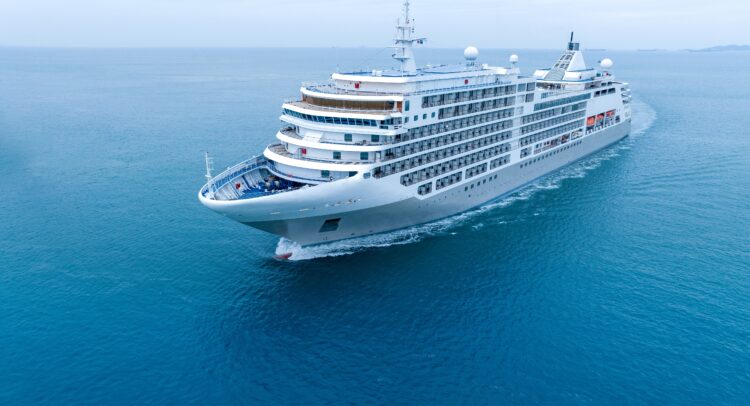Carnival Corporation (CCL) has rallied more than 60% in the past year, accompanying the stunning returns recorded by its industry peers over this time frame. Similar to other cruise stocks, Carnival’s rally has been driven by the company’s return to profitability and robust demand for cruise vacations. As we reach a few years into the recovery, investors may wonder if there is more room for growth on a seemingly attractive valuation. Others may question whether the daunting debt load will limit future upside. I lean toward the latter view.
Don't Miss our Black Friday Offers:
- Unlock your investing potential with TipRanks Premium - Now At 40% OFF!
- Make smarter investments with weekly expert stock picks from the Smart Investor Newsletter
While shares appear to trade at an attractive valuation, Carnival’s substantial debt levels, made necessary by pandemic-induced losses, hinder CCL stock’s long-term potential from here, in my view. I have a neutral sentiment on CCL at this time.

A Strong Turnaround From Losses to Profitability
Carnival’s path to recovery has been nothing short of remarkable. It was very interesting to observe that the company has been consistently profitable, with the exception of the COVID-19 pandemic. Otherwise, results have been in the black even during challenging periods like the 2008-2009 financial crisis. Carnival had never incurred an annual loss until the COVID-19 pandemic hit. The return to profitability has also ben impressive, but I’m cautious on the shares.
During the pandemic, Carnival had to adapt to the troubling reality of travel restrictions and weak consumer demand. The company’s entire fleet was grounded, and its financials suffered immensely. Between 2020 and 2022, Carnival incurred billions of dollars in losses, marking the most difficult period in its history. However, as global travel resumed, the cruise giant began to turn things around, with its two most recent quarters showing profits, including Q2. Those who know the cruise industry will understand that the third-quarter (the summer quarter) represents pinnacle performance for the year.

Debt Issuance and Business Recovery
While the recent return to profitability is encouraging, it’s necessary to mention that Carnival’s ability to survive the pandemic was mainly due to its ability to raise cash. The company raised over $19 billion in capital during these years, primarily through debt issuance, to cover its cash burn during the long operating hiatus. This massive influx of cash allowed Carnival to maintain liquidity, repatriate guests, and keep its fleet operational while preparing for the eventual recovery.
Fortunately, Carnival’s strategy proved successful. As industry conditions stabilized, its revenues and profits began to rebound rapidly. This trend has been well-sustained, evident from its most recent fiscal Q3 earnings report. Carnival posted a net income of $1.7 billion, up by over 60% compared to the previous year, on record revenues of $7.9 billion. These numbers were driven by pent-up demand for cruises and Carnival’s efforts to increase ticket prices and onboard spending. Carnival forecasts that its full-year 2024 adjusted EBITDA will exceed $6 billion, even surpassing its pre-pandemic levels!
Debt Overhang and Potential Upside
Despite Carnival’s impressive turnaround and record-breaking revenue and EBITDA projections, I believe that its substantial debt load is alarming. At the end of June, Carnival had net debt outstanding of $28.8 billion. While the company is generating record revenues, and Wall Street expects free cash flow of $2.7 billion this year, growing to $3.43 billion next year, it will take years of disciplined deleveraging to bring its debt back to safer levels. This is why I assign a neutral rating for CCL.
In terms of valuation, the stock may still appear attractive to many. Carnival currently trades at just 15.4x this year’s expected earnings and 12.1x next year’s estimate. That would seem to indicate room for further potential upside. However, I believe the company’s heavy debt load casts a long shadow over this potential. While the company’s strong earnings recovery might initially make the stock seem undervalued, much of Carnival’s future cash flow will likely be deployed toward debt repayment, leaving little to no room for reinvestment or returns to shareholders. CCL stock currently offers no dividend.
Is Carnival Stock a Buy, According to Analysts?
Looking at Wall Street, TipRanks classifies Carnival stock as Strong Buy despite its prolonged rally. This is based on 14 Buy ratings, two Hold ratings, and one Sell rating assigned in the past three months. At $23.90, the average CCL stock price target implies nearly 20% potential upside.

If you’re unsure which analyst to follow when trading CCL stock, consider Brandt Montour from Barclays (BCS). Over the past year, Brandt has been the most accurate and most profitable analyst on CCL, delivering an average return of 37.19% per rating with a 86% success rate.
Investment Takeaway
Overall, while Carnival has mounted an impressive recovery thanks to a return to profitability amid surging demand for its cruises, I believe the company’s heavy debt burden remains a notable challenge. CCL stock’s valuation may appear attractive, given near-term EPS projections, but its long-term upside is likely to be limited by the need to prioritize debt reduction. With much of its future cash flow likely deployed toward deleveraging, Carnival’s ability to invest in growth or return of capital to shareholders may be constrained, making any further potential for gains less certain in the years ahead.
My rating on CCL stock is neutral.



















